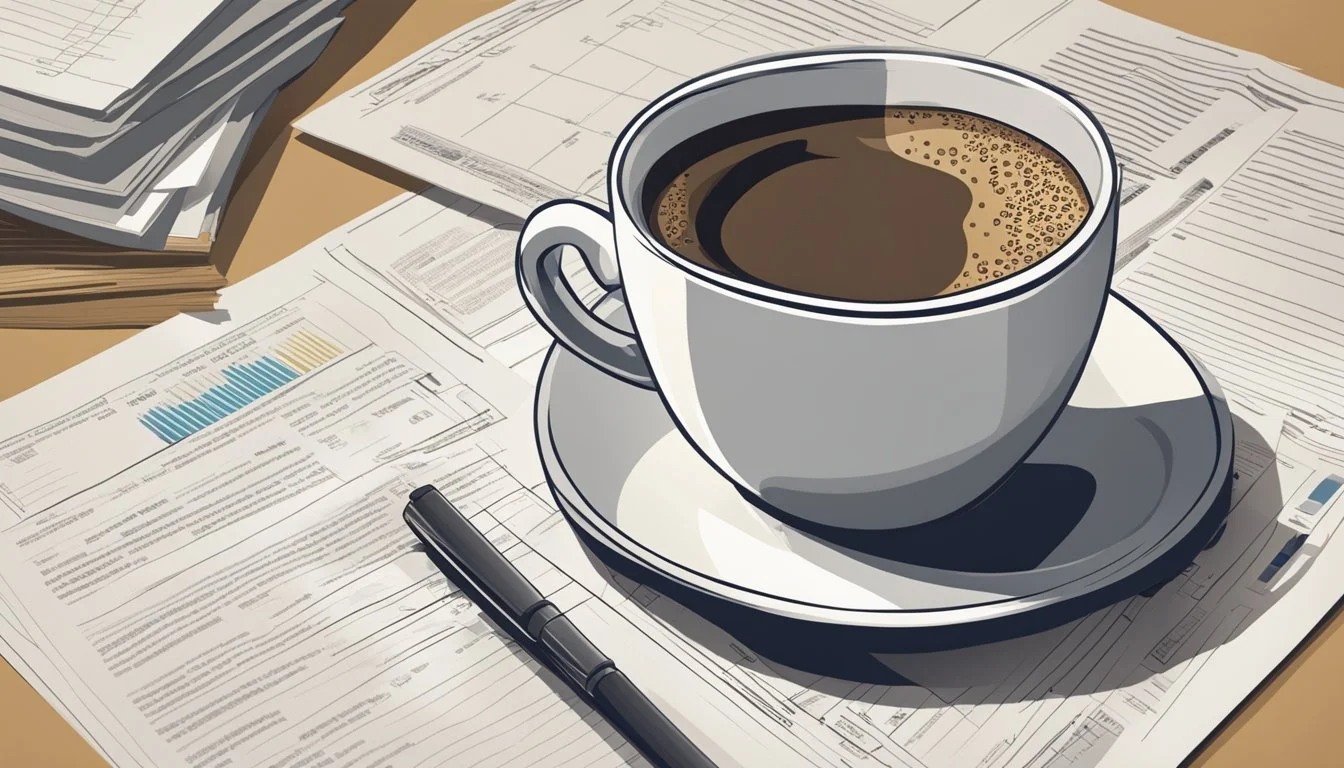Is Caffeine Good or Bad for Your Health?
Unveiling the Myths and Facts
Caffeine is a natural stimulant most commonly found in tea, coffee, and cacao plants. It works by stimulating the brain and central nervous system, helping to remain alert and prevent the onset of tiredness. Historically, caffeine has been consumed for thousands of years, with coffee and tea being among the most popular beverages worldwide.
Health impacts of caffeine have been studied extensively. For most people, moderate caffeine intake is safe and can even offer health benefits, such as improved cognitive function and reduced risk of certain diseases. For example, evidence suggests that it may enhance brain function, increase metabolism, and improve exercise performance.
However, caffeine usage does not come without potential risks, particularly when consumed in high quantities. Excessive caffeine intake may lead to adverse health effects like increased heart rate, high blood pressure, anxiety, and disrupted sleep patterns. Certain groups, such as pregnant women and individuals with specific health conditions, may need to limit their caffeine consumption to avoid potential risks.
Caffeine Basics
In understanding the role of caffeine in health, it's important to start with the basics of what caffeine is and where it's typically found.
What Is Caffeine?
Caffeine is a natural stimulant most commonly found in coffee beans, tea leaves, and cacao pods. It works by stimulating the brain and central nervous system, helping to maintain alertness and reduce the onset of tiredness.
Sources of Caffeine
Caffeine is found in a variety of commonly consumed items, prominently in:
Coffee: A brewed drink prepared from roasted coffee beans. It can contain varying levels of caffeine depending on the type and strength of the brew.
Tea: A beverage made by steeping processed leaves, buds, or twigs of the tea plant in hot water. It generally contains less caffeine than coffee.
Chocolate: Derived from cacao pods, chocolate contains a small amount of caffeine, with darker chocolates generally having more than milk chocolates.
Soda: Many soft drinks contain caffeine and promote it as an energy-boosting ingredient.
Energy Drinks: These beverages often contain high levels of caffeine, sometimes alongside other stimulant substances.
Other food items may also contain caffeine, either naturally or added during manufacturing, such as certain types of gum, ice cream, breakfast cereals, and over-the-counter medications.
Health Effects of Caffeine
Caffeine is a compound with notable effects on the central nervous system and various aspects of health, including heart function and metabolism. Consuming caffeine can have both positive and negative impacts, and the response can vary widely among individuals.
Caffeine and the Central Nervous System
Caffeine acts as a stimulant on the central nervous system. It can lead to increased alertness and reduced fatigue. However, excessive intake may result in nervousness, restlessness, and difficulty sleeping.
Caffeine's Effect on the Brain
In the brain, caffeine blocks the action of adenosine, a neurotransmitter that promotes sleep, thereby enhancing concentration and reducing the perception of effort during exercise. Overuse can cause headaches and contribute to anxiety.
Caffeine and Heart Health
Moderate caffeine consumption can influence heart function by causing a temporary increase in heart rate and blood pressure. Chronic intake of high doses, however, may be associated with an increased risk of heart disease in susceptible adults.
Caffeine Metabolism and Liver Function
Caffeine is metabolized by the liver. Moderate consumption is not associated with liver damage and may actually protect against conditions such as liver cancer. However, individuals with liver conditions should monitor their caffeine intake.
Caffeine and Diabetes Risk
Studies suggest that caffeine may lower the risk of developing type 2 diabetes by influencing glucose metabolism. Yet, for those already diagnosed, it might impair blood sugar control, necessitating careful management of intake.
Caffeine's Diuretic and Dehydration Risks
Caffeine has diuretic properties, particularly in individuals not habituated to its intake. This can increase the risk of dehydration, especially before or during prolonged exercises, if fluid intake is not adequately increased.
Benefits of Caffeine Consumption
When consumed in moderation, caffeine can provide benefits such as improved mental alertness and reduced risk of chronic diseases. Regular consumption is also associated with reduced fatigue and enhanced physical performance.
Caffeine Intake Recommendations
Caffeine is a staple in many adults' daily routines, yet intake recommendations vary among different groups due to health considerations. Understanding safe consumption for adults, children, and pregnant women helps minimize potential risks associated with caffeine.
Safe Consumption Levels
For healthy adults, consuming up to 400 milligrams of caffeine per day is typically considered safe. This equates to about four 8-ounce cups of brewed coffee. It's important to account for all sources of caffeine, which include certain soft drinks, energy drinks, tea, and chocolate when calculating daily intake.
Energy Drinks: Caution is advised as they can provide large doses of caffeine in a single serving, along with other stimulants.
Drinks with Added Caffeine: Some soft drinks and beverages have caffeine added to them; consumers should read labels to manage intake.
Caffeine Consumption in Different Populations
Certain populations require tailored advice regarding caffeine:
Pregnancy: Pregnant women are generally advised to limit their caffeine consumption to 200 milligrams or less per day due to potential impacts on fetal development.
Children: The American Academy of Pediatrics discourages caffeine consumption for children, as it can affect their developing nervous systems and have other adverse effects.
Individual Sensitivity: Some individuals may be more sensitive to the effects of caffeine and may need to adjust their intake accordingly.
For all these groups, staying informed about caffeine content in various products is crucial for maintaining a safe intake level.
Adverse Effects and Risks
While caffeine is consumed worldwide for its stimulating effects, excessive intake can lead to a range of adverse health consequences. This section explores the negative impact of overconsumption, associated health conditions, and the potential for interactions with various substances.
Negative Effects of Excessive Caffeine
Excessive caffeine consumption can result in immediate side effects such as anxiety, sleep disturbances, headaches, and a marked increase in heart rate and blood pressure. Chronic high intake may lead to high blood pressure, an established risk factor for heart disease and stroke.
Anxiety: High doses can trigger an anxiety response.
Sleep Patterns: Disruption of natural sleep cycle, leading to sleep-related issues.
Headaches: Overconsumption might precipitate headache episodes.
Blood Pressure: Temporary spikes, which may become chronic with continued high intake.
Caffeine-Related Health Conditions
Consuming large amounts of caffeine over time may be linked to health conditions such as heart disease and an increased risk of stroke. While not typically fatal, excessive long-term caffeine use can be associated with adverse health outcomes.
Heart Disease: Some studies suggest a correlation between high caffeine intake and cardiovascular disease.
Stroke: There may be an elevated risk of stroke with high consumption levels.
Death: In extreme cases, particularly when consumed in concentrated forms such as powders or pills, caffeine toxicity can lead to fatal outcomes.
Interaction with Medications and Other Substances
Caffeine can interact with various over-the-counter and prescription drugs, altering their effectiveness or increasing side effects. Additionally, it may have harmful interactions with illicit drugs and other stimulants found in energy drinks or supplements containing large amounts of sugar. It is crucial for individuals to be aware of such interactions to prevent adverse effects.
Medications: Caffeine can affect the metabolism of many drugs, changing their potency and effects.
Energy Drinks: The combination of caffeine, sugar, and other stimulants can amplify health risks.
Substances: Synergistic effects with other stimulants can increase the risk of severe cardiovascular events.
Factors Influencing Caffeine Effects
The impact of caffeine on health varies widely among individuals, influenced by genetic makeup, sensitivity to caffeine, and the development of tolerance and dependency.
Genetics and Individual Differences
Genetic factors significantly determine how caffeine is metabolized by an individual's body. Variations in the CYP1A2 gene, for example, influence the speed of caffeine metabolism, affecting energy levels and alertness. Those with a faster metabolism may require more caffeine to attain its stimulating effect, while others might experience a prolonged effect from a small amount.
Caffeine Sensitivity
Caffeine sensitivity refers to how the central nervous system reacts to caffeine. Individuals with high sensitivity may experience heightened alertness and energy even with small amounts of caffeine. Conversely, those with lower sensitivity may not feel significant changes in energy or sleep patterns, allowing them to consume caffeine closer to bedtime without disrupting sleep.
Caffeine Tolerance and Dependency
Regular consumption of caffeine can lead to tolerance, where higher doses are needed to achieve the same effects on alertness and energy. Over time, this can also lead to dependency, characterized by withdrawal symptoms such as tiredness or headaches when caffeine intake is reduced. These withdrawal symptoms can affect an individual's daily functioning and underscore the importance of understanding and managing one's caffeine intake.
Caffeine Withdrawal & Management
When reducing caffeine intake, individuals can experience withdrawal symptoms, yet with effective strategies, these can be managed.
Recognizing Withdrawal Symptoms
Withdrawal from caffeine often leads to a range of physical and psychological symptoms. The most common symptom that individuals face is a headache, which can be pronounced and persistent. Other withdrawal symptoms include:
Irritability: Mood changes such as increased frustration or agitation.
Fatigue: A state of lingering tiredness or drowsiness.
Tremor: Slight to significant shaking or trembling of the body.
Consulting a doctor can provide insight into the withdrawal process and help determine if the symptoms experienced are due to caffeine reduction or another health issue.
Strategies for Caffeine Reduction
Reducing caffeine intake requires a structured approach to minimize withdrawal effects. Here are some strategies:
Set a Caffeine Limit:
Restrict the amount of caffeine consumed daily.
Cease caffeine use by the early afternoon to avoid sleep disruption.
Gradual Reduction:
Decrease caffeine consumption slowly over time rather than stopping abruptly.
Alternate Sources:
Incorporate beverages with lower caffeine levels, like decaffeinated coffee or herbal tea, into the diet.
Stay Hydrated:
Drinking water can alleviate some withdrawal symptoms such as headache and irritability.
Health Professional Advice:
Consult with a healthcare provider for personalized guidance tailored to individual health needs.
Caffeine in Special Diets and Wellness Practices
Caffeine is often considered within specialized diets and wellness routines, owing to its effects on energy levels and metabolism. Here, we focus on how caffeine influences weight management, enhances athletic performance, and how decaffeinated options fit into wellness practices.
Caffeine's Role in Weight Management
Caffeine is commonly included in weight loss strategies due to its potential to boost metabolism and fat burning. Specifically, it could increase the resting metabolic rate, which in turn may aid in weight management. Some people incorporate caffeine into their diets by consuming beverages like green tea and black coffee, which have natural caffeine content.
Increases Energy Expenditure: Studies have found that caffeine can enhance the amount of energy the body uses while at rest.
Appetite Suppression: Caffeine might contribute to short-term appetite suppression, making it a consideration in dietary plans for weight loss.
Caffeine and Athletic Performance
In exercise routines, caffeine is recognized for its ability to enhance performance. Athletes may consume caffeine to improve their endurance and reduce the perception of effort during exercise.
Endurance: Caffeine can help athletes perform longer by influencing the body's use of glycogen and fatty acids for energy.
Strength Training: Some evidence suggests that caffeine may increase muscle strength and power, although results can vary based on individual responsiveness.
Decaffeinated Alternatives
Decaffeinated coffee and other decaf beverages provide an alternative for individuals looking to reduce their caffeine intake but still enjoy the taste and social ritual of coffee-drinking.
Similar Taste Without Stimulation: Decaf options offer a way to enjoy coffee's flavors without the stimulating effects of caffeine, which can be beneficial for those sensitive to caffeine or with certain dietary restrictions.
Presence in Wellness Routines: For those practicing sleep hygiene or stress reduction techniques, decaffeinated beverages are often recommended as part of a calming nighttime routine.
Cultural and Consumer Perspectives
Caffeine consumption varies globally and plays a significant role in cultural practices, consumer behavior, and popular media.
Global Caffeine Consumption Trends
Caffeine is widely consumed worldwide, with notable differences in preference and consumption patterns across cultures. In North America and Europe, coffee remains a staple, with millions starting their day with a cup of java. Decaffeinated coffee also has its niche audience, catering to those seeking to reduce caffeine intake without giving up the ritual.
In contrast, tea holds cultural significance in countries like China and the United Kingdom, where it is integral to social ceremonies and daily routines. Soda and energy drinks are prevalent globally, especially among younger demographics for their convenience and marketed energy-boosting properties. Markets show a growing inclination towards beverages that offer both tradition and a caffeine kick.
Coffee: Essential morning beverage in many Western countries.
Tea: Cultural icon in Eastern nations, with numerous varieties.
Soda: Popular for its sweetness and availability.
Energy Drinks: Sought after for immediate energy boosts.
Caffeine in Popular Culture
Caffeine's influence extends to popular culture, manifesting in television, film, and literature. It is often portrayed as a necessity for high-paced life, depicting characters reliant on their morning coffee or energy drink to navigate through busy schedules. Chocolate, while less caffeinated, enjoys universal appeal and frequently appears in cultural contexts that celebrate indulgence and comfort.
Coffee shops, sometimes the setting of pivotal scenes, epitomize the beverage's cultural significance. They serve as communal hubs where ideas are exchanged over cups of coffee or tea, reflecting their societal importance beyond mere caffeine content. From the omnipresent espresso in Italian cinema to the intricate tea ceremonies in Japanese culture, these beverages are imbued with a deep sense of identity and tradition.
Emerging Research and Future Directions
Research on caffeine continues to advance, revealing both potential health benefits and concerns. Scientists are currently exploring innovative delivery methods and further investigating caffeine's multifaceted effects on health.
Recent Studies on Caffeine and Health
Recent studies have suggested that caffeine, found naturally in tea leaves, coffee, guarana, yerba mate, and herbal tea such as green and black tea, may have a range of health benefits. These studies highlight improvements in cognitive function, potential antioxidant properties, and anti-inflammatory effects. Research has also examined caffeine's role in pain management.
Cognitive Function: Investigations indicate that moderate caffeine consumption can enhance attention and alertness.
Antioxidant Properties: Caffeine contains compounds that may contribute to its antioxidant effects, which protect cells from damage.
Anti-inflammatory Effects: Some research points to caffeine's ability to reduce inflammation within the body.
Pain Management: Caffeine has been recognized for its potential to augment the effectiveness of pain relief medication.
Ongoing Debates in Caffeine Research
The health benefits of caffeine are a subject of ongoing debate among researchers. There is a constant evaluation of the balance between its stimulant properties and the potential for overconsumption leading to adverse effects. Studies continue to assess the optimal level of caffeine intake that can be considered safe for general health.
Optimal Consumption Levels: The recommended safe levels of caffeine consumption vary, with most research advocating for moderation.
Varied Effects on Different Individuals: Caffeine's impact can vary significantly from person to person, influenced by genetic factors and individual tolerance levels.
Emerging delivery strategies for caffeine, involving the field of nanotechnology, are also being researched to potentially enhance the duration of caffeine's effects and target its delivery more precisely within the body. This could lead to developments in how caffeine is consumed and its subsequent impact on health.
Conclusion
In evaluating caffeine's impact on health, it becomes clear that moderation is key. Intake should not exceed 400 milligrams per day for most adults to avoid negative side effects. This is equivalent to about four cups of brewed coffee. Consuming caffeine within these limits can lead to increased alertness and wakefulness, which many individuals find beneficial for daily functioning.
However, individuals may experience varied sensitivity to caffeine, and some can encounter adverse symptoms, including disrupted sleep patterns, anxiety, and increased heart rate. It is important for each person to monitor their own response to caffeine and adjust their consumption accordingly.
Caffeine's influence on health includes both potential benefits and drawbacks. Its consumption is associated with a decreased risk of certain diseases, such as Parkinson's and Alzheimer's. Nevertheless, high consumption can lead to health issues, underscoring the importance of mindful intake.
For persons with specific health conditions or those who are pregnant, it is advisable to consult a healthcare provider to determine an appropriate caffeine consumption level. Ultimately, caffeine can be a part of a healthy diet when consumed responsibly and in consideration of individual health circumstances.
Appendix
In this section, readers can expect to find detailed information concerning the various common sources of caffeine and the amounts typically found in these sources.
Common Sources and Amounts of Caffeine
Many everyday substances deliver caffeine into the body. It's essential for consumers to be aware of these sources and the caffeine content they carry to manage intake effectively.
Coffee is a primary source of caffeine. On average, an 8-ounce (240-milliliter) cup of coffee contains about 95 mg of caffeine. However, this amount can vary based on factors such as the type of coffee bean, the roasting process, and the brewing time.
Brewed coffee: 95 mg per 8 ounces
Espresso: 64 mg per 1 ounce
Decaffeinated coffee: 2-5 mg per 8 ounces
Tea, depending on its strength and variety, ranges from 14 to 70 mg of caffeine per 8-ounce serving.
Black tea: 40-70 mg per 8 ounces
Green tea: 20-45 mg per 8 ounces
Iced tea: 10-30 mg per 8 ounces
Soft drinks, particularly colas, often contain caffeine. A standard 12-ounce can may have 30-40 mg of caffeine.
Cola: 30-40 mg per 12 ounces
Energy drinks have much higher caffeine contents, sometimes as high as 250 mg per 8 ounces.
Energy drinks: 100-250 mg per 8 ounces
Dietary supplements and over-the-counter medications also frequently contain caffeine. The amount may vary widely from 100 to 200 mg per serving or capsule.
Consumers also add various extras such as cream and sugar to caffeinated beverages, which do not contain caffeine themselves but can affect the overall flavor and caloric intake of the beverage. Moreover, water, another integral part of most caffeinated drinks, does not contain caffeine but serves as the solvent in which caffeine is dissolved for human consumption.








